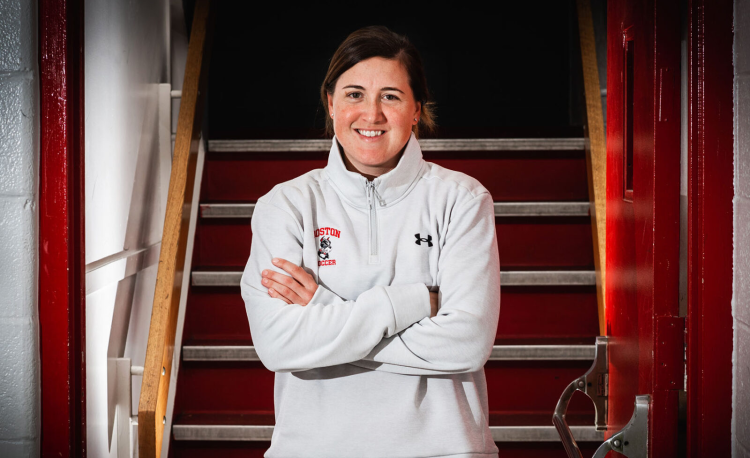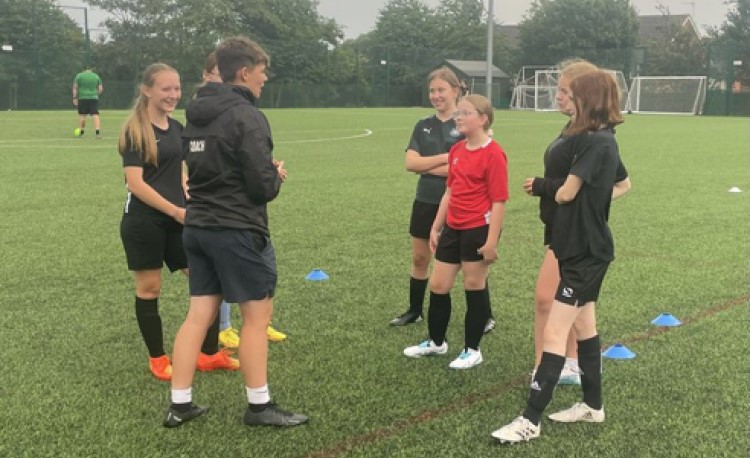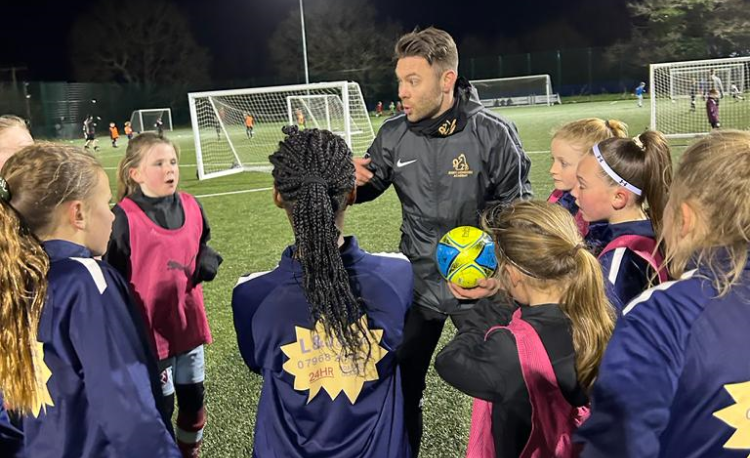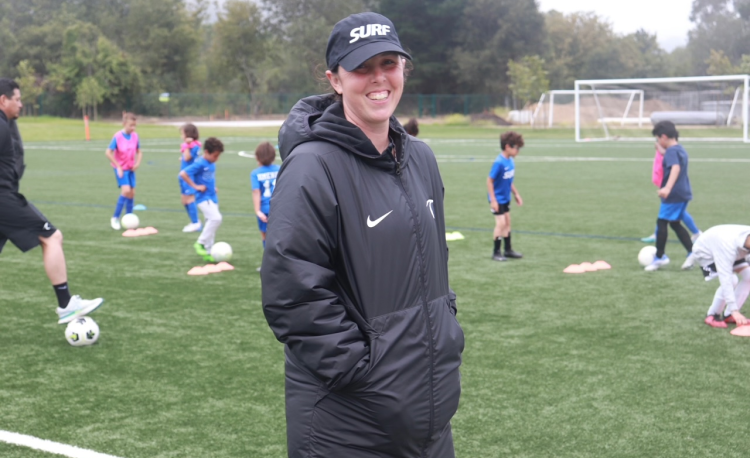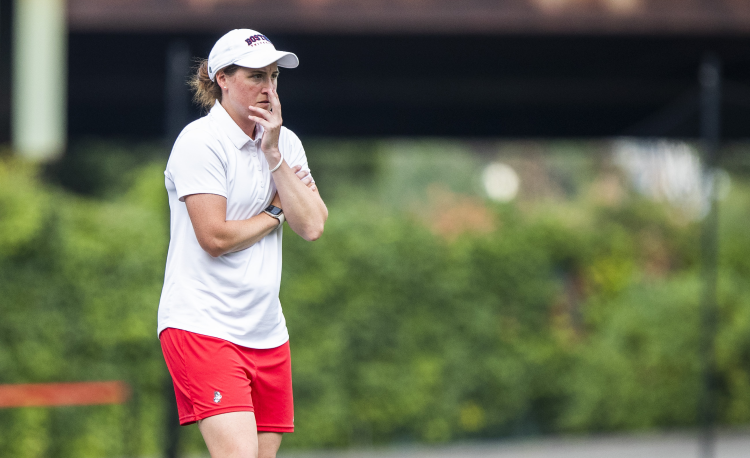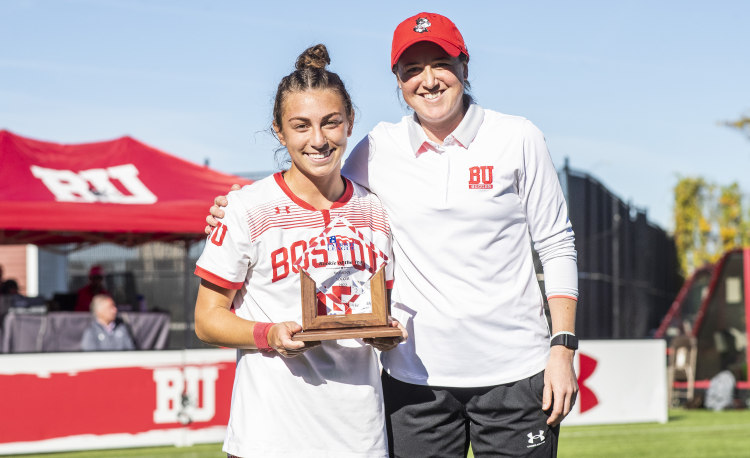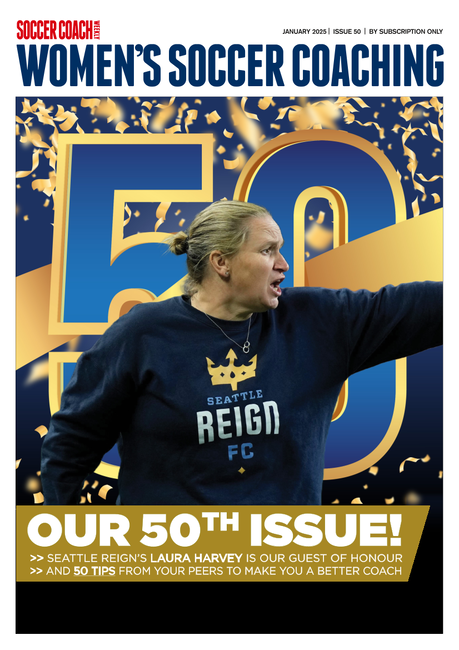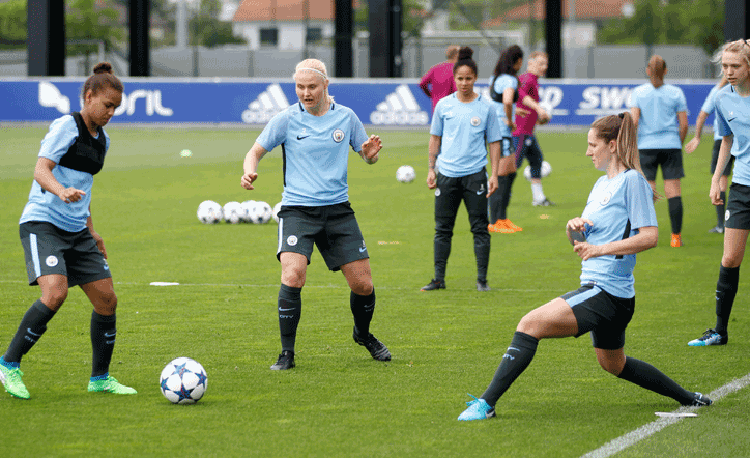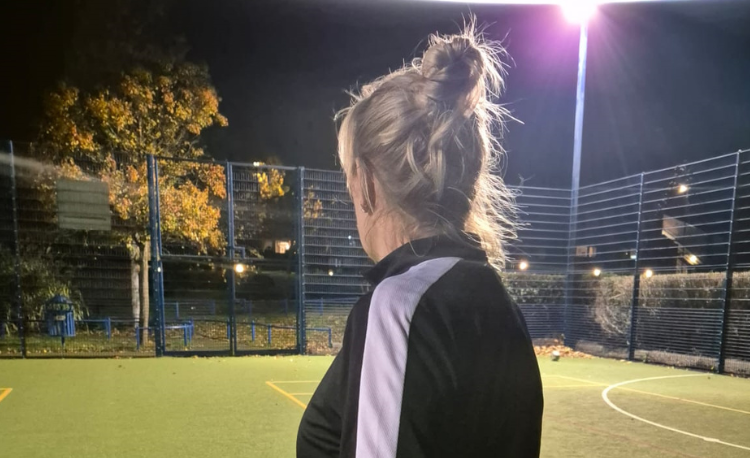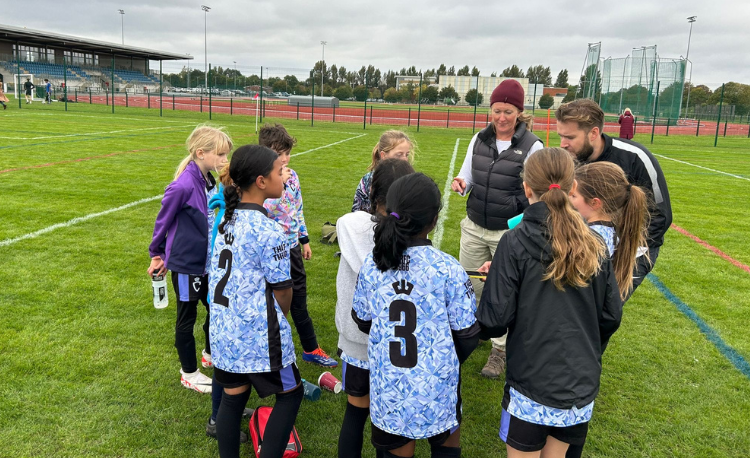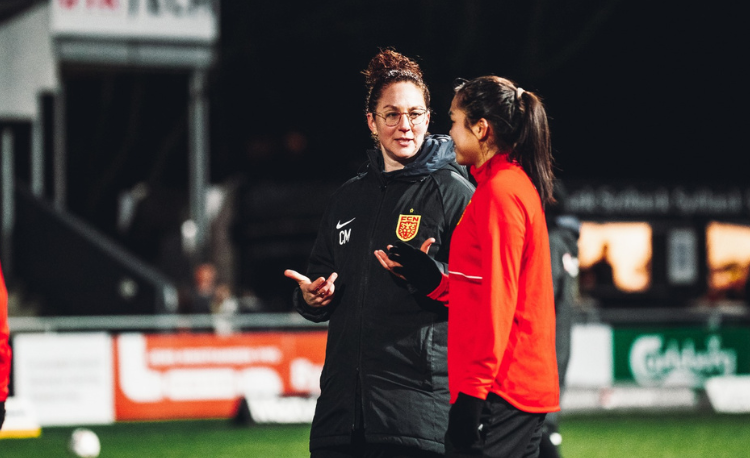You are viewing
1 of your 3 free articles
Casey Brown: Defining success
Boston University head coach Casey Brown discusses the process of improving players on and off the field and why titles aren’t everything.
“Success, for me, is a process,” says Boston University women’s soccer head coach Casey Brown.
“It is the process of trying to become great,” she adds. “It is the process of trying to become better every day. It’s the journey.
“That’s how we view it in our program. That’s how I try to view it in the way I lead and coach.
“It is not a destination but a journey and a process that we get to go on every day with our amazing student athletes.”
It is a profound definition. One would be forgiven for thinking someone with as successful a soccer career as Brown would focus her summary of success around championships, wins and awards.
Brown was a decorated player. Boston is, in fact, her alma mater and during her time there as a player, she led the Terriers to four straight NCAA appearances and three league titles.
She was named an All-American in her senior season with BU and is the only woman in America East soccer history to be named the top player at her position three times.
She then went on to play professionally with the Boston Breakers.
Brown has also been decorated as a coach. She won the Mid-Atlantic Assistant Coach of the Year in 2015, as an assistant at BU under Nancy Feldman, and was named 2019 Patriot League Coach of the Year, during her time at Holy Cross College.
“It’s not a destination but a journey we go on every day with our student athletes...”
In her fourth and final season at Holy Cross, Brown led the team to their best season in nearly two decades.
She went on to the University of Pennsylvania, where the program achieved its second-highest win total since 2013.
And, in the 2022 season, her first in charge of Boston, her team lost only one game and reached the semi-finals of the Patriot League Tournament.
Despite having taken her ability to garner recognised success from her playing career into her coaching career, Brown’s take on what success actually is has developed as she has switched roles.
“I think when you’re a player, you focus so much on those results, those games and those championships,” Brown told WSC.
“I think your perspective broadens when you have those experiences as a player, as a student athlete, and then you go through different coaching ranks and you peel back those layers.
“Honestly, your perspective widens and broadens and you are able to see things with a bigger perspective in mind.
“I think that is really good and a healthy mentality to have. For me, as a leader for our young women, I think it’s really important to continue to guide them with that perspective because I think it’s easy to really fall into when the highs are high and the lows are low – we want to be a little bit more even-keeled and have more of that perspective.”
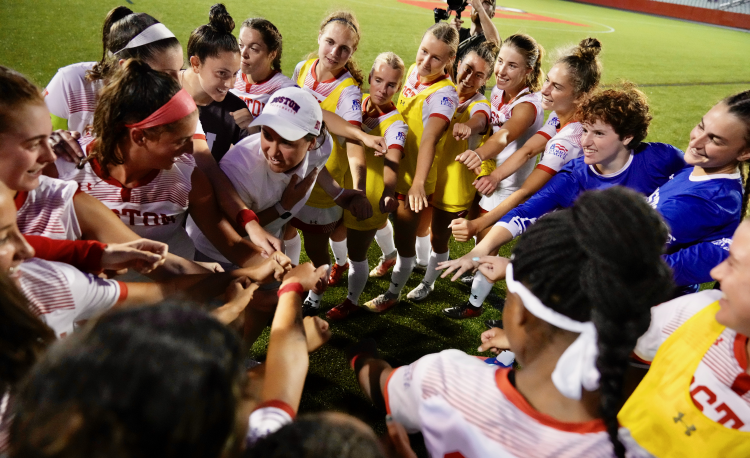
Make no mistake – Brown may have gained perspective, but she still wants to win.
“I’m a competitor too, as the head coach of this program,” she explains. “We obviously want to compete for championships every year. We want to win games.”
It’s clear, though, that she wants to do it her way. In taking over from Feldman - who spent 27 years at the helm of the Terriers and was equal part boss, mentor and friend - Brown became only the second head coach in the program’s history.
Despite being BU through and through, and hoping to continue so much of what she’s known the Terriers to be over the course of her association with them, Brown says the program will soon bear her hallmark.
“You’re naturally just going to be yourself. That’s all I know how to do,” she said. “There will obviously be little things that I make my own and put my stamp on.”
At the foundation of Brown’s way is her approach of ‘person over player’.
“The way I try to focus on leading is having strong relationships with all of our players, getting to know them,” she says.
“When you do that, you can establish a good relationship and level of trust. We value all of our players and want to hear from them.
“I think we do a good job of trying to meet them on their level, meet frequently and have open lines of communication.
“I think what’s really cool is there’s a real buy-in and a real collective to what we’re trying to chase. The humility of this group is that no person is bigger than this program.
“That’s been a lot of the tradition, as well. I think there is a lot of unity in what we are trying to do, which is cool, but they all have their own personalities and they all bring something.
“I think when you can foster an environment that has high standards and high aspirations, but also where players feel empowered to connect and talk and share, that’s how we get stronger, ultimately.”
Those high standards and aspirations are being shaped and committed to now, as BU work through their pre-season, which Brown says is about coming together, having a strong identity and creating some of the frameworks for the program’s aspirations for the season.
She said: “The overarching goal is to fulfil our potential. That’s the challenge for our coaches: we want to continue to make this group, individually and collectively, better every single day.
“It’s not a perfect, linear process but that’s ultimately what we’re trying to achieve.
“Of course we have aspirations to win a championship. It’s okay to be able to say that in the locker room and as a group I think they’re really motivated to do that.
“The girls have a real hunger and desire to chase that. But we know we’re very process-oriented. We don’t overlook anyone and we ultimately try to focus on each session and each opportunity to grow as a group.”
This link between both individual engagement and success, and team engagement and success, is one that Brown clearly works hard on.
“People are competitors and all want to start or be in the field. That’s not a reality, because it’s a Division 1 soccer program.
Casey on the importance of ‘30,000-foot’ reflection time
“What’s really unique about the college season is you spend a lot of time thinking [about] why you’re doing what you’re doing.
“I spend much more time now reflecting than ever. I think that is such an important process to coaching and trying to get better.
“It is so easy to lose yourself in the rhythm of a season. Let’s say I’m in ‘game mode’ – I’m preparing for a game, I’m planning for a game, I’m recovering and then I’m already thinking about the next one. It’s so easy to get into that cycle.
“But I really try to find and plan times where I get more reflection time. There’s a lot of zooming out and ‘30,000-foot perspective’ reflection time that I try to have.
“You obviously do have to be in the weeds, too, to be able to pick out pieces that you continue to grow your team with.
“A hugely important part of the process is staying fresh and questioning things that you do.
“It’s reflecting, and just trying to grow each week, each season, each year.”
Related Files
“All we can do is provide an environment where we’re giving transparency and respect, where players feel supported and in a space where they can continue to get better.
“We coach up every single player. Whether you’re a starter or a player that might contribute in different ways on the practice field or on game day, we’re going to help try to move your needle further and grow you in areas.
“If we make each player stronger, it’s making the whole group better.”
And when her players win individual accolades, like the ones she was used to getting as a player – last season, six Terriers garnered All-Patriot League honors, tied for most in the league – Brown is really conscious of drawing that line back to the team.
“The way I view it is, if we’re getting recognized for individual honors, that means our team’s doing something well, because our team needs to do well for those individual honors to happen,” she explains.
“We always make time to properly acknowledge those individuals. It’s something to be proud of. Those are great honors and accolades to be able to share with everyone.
“We always make a point within the locker room, when we reach those accolades or milestones, of acknowledging them and celebrating them.
“Then, once we celebrate it, we know it’s also not all-defining and those individual players know it’s not all-defining. We continue to move forward.”
Brown wants her players to be recognised for their achievements off the pitch too.
In each of her coaching roles, her teams have excelled academically – most recently, for the past three semesters, her BU team has had the highest GPA [grade point average] in the athletics department.
“We coach up every single player. We’re going to try to move your needle further...”
She also wants them to make a significant difference to the community. At Holy Cross, for example, Brown instituted a community service program that resulted in the most service hours of all Division I women’s soccer programs.
“I view my role as so much more than a soccer coach just doing Xs and Os in their office,” Brown explains.
“The reason why I love being in this game, being a Division 1 women’s soccer coach and working with 18- to 22-year-olds, is I love helping young women become the best version of themselves.
“I really try to make sure we prioritize having an environment, a culture and a program that helps these young women.
“It stands for so much more than just their soccer, but helps them grow as communicators, as leaders that care about the environment and community around them, that want to excel, and take pride in how they do in the classroom.
“Those things all matter to me and to the players that make up our program. We really try to walk the talk and not just be a hashtag.
“We make sure these players are practicing and valuing things in those different spaces – academically, first and foremost, but also in the community.”
Success is, according to Brown: a process, a journey, trying to become better every day, off the field and on it. The championships, victories and awards? Buy into all of the above, and they’ll come.
“Players respect it, it really resonates” – Casey on the importance of showing your vulnerability as a coach
“You’re a human being. As a leader, if you can be honest about stuff, show vulnerabilities, take accountability and stand up in moments when you don’t quite get it right, or wanted something to come across differently, and you own it, I think players respect that.
“I think you are being more authentic if you can portray that level of accountability and vulnerability and, honestly, just be a human being. I think that really resonates.
“More than ever, people really care about what you’re about and what you show as a person. I know that goes a long way.
“It’s important to be mindful that you’re not always going to get it right 10 times out of 10. Finding the level of trust [your players] have in you, but also [show] humility and vulnerability when appropriate, because that’s part of it too.”
Newsletter Sign Up
Newsletter Sign Up
Discover the simple way to become a more effective, more successful soccer coach
In a recent survey 89% of subscribers said Women's Soccer Coaching makes them more confident, 91% said Women's Soccer Coaching makes them a more effective coach and 93% said Women's Soccer Coaching makes them more inspired.
*includes 3 coaching manuals
Get Inspired
All the latest techniques and approaches
Women's Soccer Coaching offers proven and easy to use soccer drills, coaching sessions, practice plans, small-sided games, warm-ups, training tips and advice.
We've been at the cutting edge of soccer coaching since we launched Soccer Coach Weekly in 2007, creating resources for the grassroots youth coach, following best practice from around the world and insights from the professional game.
